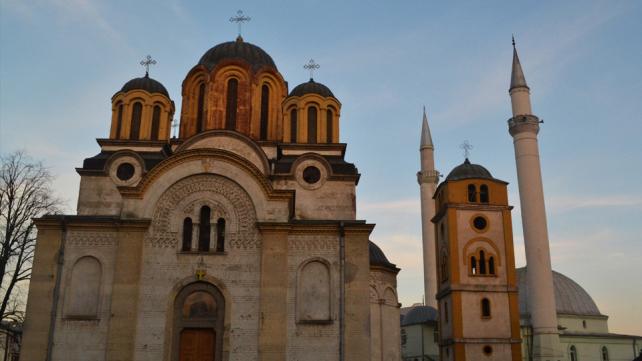
There were great times and there were the bad ones.
Tolerance, respect and cooperation some times. Murder, intolerance and hostility on other occasions.
These have been some of the defining features of Muslim-Christian relations throughout history. Here are some examples of the good and the bad.
First the good memories:
1. Habasha and the Negus
It was a Christian king in a predominantly Christian land who gave the small, persecuted community of early Muslims in the beginning of the Prophet Muhammad's mission protection. May Allah's peace and blessings be upon the Prophet.
The Muslims sought refuge in Habasha, modern day Ethiopia, after suffering starvation and torture at the hands of the polytheistic Makkans. The Prophet Muhammad said about the Negus and Habasha: "a king rules without injustice, a land of truthfulness."
Muslims were welcomed, protected and lived in peace with the Christians of Habasha. But this did not sit well with the Makkans, who did not want to see them leave Makkah or want the message of Islam to flourish in peace.They spent special envoys with gifts and lies about the Muslims to convince the Negus to send the Muslims back to Makkah. They told the Negus that this "new" faith took pride in insulting not just ancestral Makkan beliefs, but the beliefs of Christians as well.
Another king may have simply taken their word and automatically kicked the Muslims out. The Negus did not. He ordered that the leader of the Muslim community come to his court and explain Islam's position.
Enter Jafar ibn Abu Talib, early Muslim refugee to Habasha, and cousin of the Prophet.
Not only did he eloquently explain the message of Islam and the persecution of those who accepted this truthful message. He also recited the opening verses of Surah 19 of the Quran, Surah Maryam or Mary, after the Negus asked him to recite part of Quran.
King Negus listened to the recitation of the Quran in focused attention. He cried as he listened, so much so that his beard got wet. When Jafar completed the recitation, Negus said, ‘Surely this Revelation and the Revelation of Jesus were from the same Source.' Then to the two Makkan ambassadors, he said, 'By God, I will not hand over these persons to you.'
But the story does not end here. The Makkans would not give up so easily. They asked the king to find out what the Muslims' view of Jesus and his Divinity were, knowing of course, the difference in the Christian and Muslim positions regarding Jesus.
Again, Jafar responded, with no compromise of principles, just the simple, clear Truth:
'He (Jesus) is God's servant and Messenger; a spirit and a word from God that He bestowed on the Virgin Mary.'
Upon hearing this, Negus picked up a straw from the ground and said:
‘By God, Jesus was not even as much as one straw more than what you have said about him.'
He returned the gifts of the Quraysh. Negus told them he was not used to taking bribes and the Muslims would remain under his protection.
This was an early victory for positive Muslim-Christian relations.
2. Umar ibn al-Khattab and Jerusalem
Jerusalem and its surrounding territory were and remain holy to Muslims, Christians and Jews. It was during the Caliphate of Omar ibn al-Khattab that Muslims first gained leadership of this territory. May Allah be pleased with Omar.
The Muslim reaction to this victory is something to remember.
Omar entered Jerusalem in humility. He walked in with not he, the Caliph, but his servant comfortably riding on a camel. They had been taking turns walking and riding.
At one point in Jerusalem, the Christians asked him to pray in their church but he declined. He said he was afraid that in the future Muslims could use this as an excuse to take over the Church to build a Masjid.
The Christians gave the key of the Church of Resurrection to Muslims to be responsible for its safety. This key is still with the Muslims today as a sign and symbol of the mutual trust.
3. Saladin (Salah el Deen Ayyubi) and the Crusades
It was in response to the horrific oppression in Jerusalem at the hands of the Crusaders in the 11th century and the need to free the area of their control that Sultan Salah el Deen Ayyubi (Saladin) liberated Jerusalem from them in 1187.
His arrival brought relief for the local Christian population, who helped him, after the oppression they suffered at the hands of their co-religionists, the Crusaders.
Not only did Saladin treat the Crusaders with kindness, he ensured that Muslims and non-Muslims lived in peace and harmony with each other.
One particular story about him recounts that some Muslim soldiers were besieging a Christian fortress. Many Christians were seeking shelter inside, including a young couple who was planning to get married, but whose plans had been stopped by the fighting. They decided to get married anyway, even though they were trapped inside the castle.
Saladin was in charge of the Muslim troops at this time. When he heard about the wedding, he ordered his soldiers not to attack the castle where the couple was staying, so that they could enjoy peace and quiet. In return for this respect, the bride's mother sent out trays of food for Saladin and the Muslim army to share in the wedding celebrations.
Indeed the longest period of peace and justice for all in Jerusalem has been the period when Muslims were in control.
Now the bad news
1. The Crusades
During the Crusades (1095 until 1291) European Christians attacked and occupied this Holy land. They oppressed the Muslims, the local Christians and the Jews. These Crusaders killed over 200,000 innocent civilians.
The aim: to wrest control of Jerusalem from the Muslims. This was not only a period of bloodshed, hostility and violence. It was also the beginning of collective Western stereotypes of Islam and Muslims, according to some scholars.
The Crusades ended centuries ago. But today, the remnants of those stereotypes have taken on new meaning. Muslims are still bloodthirsty, violent savages by most of the mainstream media's standard. The propagation of these views on the collective level through the media has affected Muslims globally and locally. Muslims in America, while living peacefully with Christians and other religious groups, are still subject to discrimination in varying degrees, and physical violence and harassment in the worst cases.
While the Crusades were bad news for Muslims and even local Christians living alongside them, one significant outcome of this contact between Muslims and Western Christians was the passage of knowledge from one to the other.
Christians, through the Muslims, were able to access texts like those of Aristotle, for instance. The Muslims clearly passed on an intellectual heritage, which a number of scholars say laid the foundations for the modern Christian West. For more discussion of this, please see the book " Islam and the Discovery of Freedom by Rose Wilder Lane.
2. Muslim Spain versus Christian Spain
Many Muslims look back at Muslim Spain with pride. But Jews also call it their "golden era".
Spain became part of the Islamic world at the beginning of the eighth century. Under Muslims, Spain became the center of civilization. Although many local Spaniards embraced Islam, Christians and Jews were free in all aspects of their lives. The Muslims respected their religion and institutions. The result was the birth of the first true cosmopolitan culture in the West.
Christians studied alongside Muslim scholars to such a degree that in 854, a Christian named Alvaro of Cordoba complained that these students were forgetting their own religion and culture.
The Muslims and Christians of Spain did not live in their ghettos, isolated and not cooperating in various aspects of daily life together.
It was in Spain that Aristotle's works on physics and natural history were translated into Arabic from Greek. Historians generally acknowledge that the Muslim world proved to be a major conduit of ancient scholarship into the West, especially through Muslim Spain.
It wasn't just Muslims and Christians who thrived in Spain, though. Jews, who were reviled and hated elsewhere, were not only living safely and peacefully alongside non-Jews in Muslim Spain, they were learning and contributing to its culture and knowledge which Muslim scholars had established.
But this success in wealth, knowledge and co-existence came to end in a violent and very sad way.
As Christian Crusaders of Spain expelled Muslims, civilization that took centuries to build was destroyed. Muslims and Jews were either expelled or forced to convert to Christianity. Millions died as tolerance was replaced by the Spanish Inquisition. A suspected Muslim was to be killed for the smallest act resembling Islamic tradition - such as taking a bath on Friday.
3. European colonialism (1500s to the early 20th century)
European colonialism was such a powerful force that by 1900, 90.4 percent of Africa was under European or American colonial control. This was a political and economic phenomenon that began in the 1500s. Various European nations "discovered", conquered, and exploited large areas of the world.
In a quest for silk, spices and world domination, European explorers, like Christopher Columbus set out to sea. He ended up in North America. The result: the slaughter and destruction of millions of Natives and the usurpation of their land by Europeans.
In Muslim lands, colonialists wreaked havoc, supplanting Islamic educational systems with secular or Christianity-focused ones, and murdering and/or enslaving the natives of Africa, South Asia and the Middle East, for example.
They also acculturated the "savage" natives to the "refined" customs of Europe. In the Indian subcontinent today, the term "Brown Sahib" is used to refer to a native who is mentally colonized by the West. There are similar stock characters in other Muslim cultures.
4. Armenia-slaughter at the hands of Muslims, early 20th century
The predominantly Christian Armenians consider the greatest disaster in their history to be their murder and deportation from Turkey during World War I.
In 1915 as Turkish Armenians aligned with the pro-Christian Tsarist Russian enemy, the Turkish army reacted strongly against this betrayal. Although, according to Encyclopedia Britannica, statistics are disputed regarding the Armenian population in Ottoman Anatolia at the outbreak of World War I and the number of Armenians killed during this deportation, a large number of Armenians died during this civil war.
Those Turkish Armenians who survived migrated to places like predominantly Muslim Lebanon and Syria, as well as Russia, France, and the United States.
5. Current relations between the Muslims and Christians
Today 70% of all refugees in the world are Muslims. To Muslims, many of these refugees and other conflicts are a result of their powerlessness.
Muslims feel culturally enslaved, in many ways to the predominantly Christian West. The United States, with the new geopolitical reality of uni-polar world, continues to dictate policies to smaller nations of the world.
This new form of colonialism is done with the help of local lackeys in Muslim countries who take their orders about how their countries should be run from Washington, D.C. as opposed to locally.
On a larger level, British, French, American and Russian colonial powers (all Western, and all predominantly Christian) also control Muslim and other Third World countries through international institutions like the World Bank, the International Monetary Fund (IMF), and the Security Council of the United Nations.
This excessive power over the lives of millions is perceived by a number of Muslims as the continuing perpetuation of the colonial era. For most Muslims, colonialism is not about the spread of "refined European civilization". It is about massacre, slaver, and weakness. It is nothing to proudly look back upon.
The fight against tobacco
One example of modern American colonialism can be found in the fight against tobacco in the United States.
In the last eight years, the US tobacco industry has lost business because of public health awareness campaigns against smoking. But in the same period the industry has achieved the record profits. How?
They now have an open market to sell their deadly products to Third World consumers, thanks to the help of the American government. So cancer is bad for Americans, but it's okay for others. Where is the justice?
Despots and dictators: not in my backyard, but fine for yours
A second example of Western neo-colonialism is found in these countries' support for corrupt dictators, totalitarian despots and anti-democratic forces in the Muslim world. Muslims question how sincere the Western belief in justice and democracy really is when this happens.
For instance, the government of France supported the Algerian army when it canceled elections following the victory at the ballot of the Islamic Salvation Front party in 1992. France is the country famed for "liberty, equality and fraternity". It seems this is not what they had in mind for the Muslims in their former colonial baby, Algeria.
The United States, which touts "freedom and democracy" has similarly supported undemocratic regimes in Muslim and other countries. Justice, it seems, is not for all, especially not Muslims.
Muslim minorities in the West versus Christian minorities in Muslim countries
Both of these groups of minorities have been the brunt of stereotypical images in the local media, along with various forms of harassment. For example, several Masjids in America have been burned down and attacked as have chuches in Nigeria, Pakistan and Indonesia. Tribal clashes in Nigeria have taken on a religious color and a number of Christians have been murdered outside churches in Pakistan.
Muslims in Muslim countries must protect the rights of their Christian neighbors to freely practice their religion as well as their freedom of speech, as Prophet Mohamed (peace and blessings be upon him) and the rightly guided Khalifas after him did.The constitution the Prophet drafted in Madinah following his migration from Makkah enshrined the rights of Christians and Jews in the city, including those of worship. These were fully enforced under his leadership. Another example was when Umar ibn al-Khattab was Khalifah. He returned tax money collected from Christians in a town in modern day Iraq after he and the Muslims had to leave it. The taxes had been collected to ensure Muslim protection of the Christians living there. Since the Muslims could no longer do that, they returned the money.
Similarly, Christians in countries like America must stand up for Muslims' rights, especially those of free speech and freedom of religion. This way, both groups can build bridges of understanding and tolerance in a world currently fraught with violence, terror and destruction.
Still Some Examples of Cooperation
But amid these examples of New World Order colonialism and tense Muslim-Christian relations, there are some bright spots.
In the 1990s, the West did eventually come to the aid of Muslims following massacres, rapes and the oppression of Muslims in Bosnia and Kosova.
On the level of faith, the 1994 United Nations Conference on Population in Cairo, Egypt, became a platform for Muslim and Catholic cooperation against perceived anti-religious bias.
In addition, it is somewhat ironic that while Muslims resent the Western support for dictatorships in their countries, they turn to the West when seeking to escape the oppression in their countries. For example, Iran's anti-Shah revolutionaries were essentially based in the West.
It is not uncommon to find Muslim refugees escaping to Germany, France, Britain, America and Canada. While many of them are economic migrants, seeking a better life for themselves and their families on a financial level, there are also those escaping political turmoil and corruption in their home countries.
The current situation
In September 2006, Pope Benedict XVI set off worldwide controversy while quoting Manuel II during a lecture at the University of Regensburg in Germany: "Show me just what Mohammed brought that was new, and there you
will find things only evil and inhuman, such as his command to spread by the sword the faith he preached."
The reaction was swift and strong from Muslims the world over. While Pakistan's parliament voted to condemn him, Lebanon's leading Shia leader asked for a personal apology. The deputy head of Turkey's governing party put him in the same category as Hitler and Mussolini. Unfortunately, two churches in Palestine were bombed and a nun in Somalia killed over the incident.
This was followed by an apology in which the Pope said he was "deeply sorry" about the angry repercussions of his comments, adding that the quotation was not an expression of his personal views.
The Pope's statement is being taken by Muslims as part of a continuity of Islamophobic statements made by high profile Christians like Franklin Graham, who has described Islam as a "very evil and wicked religion".
Although some mainstream churches opposed Graham's statement, most adopted a silent or neutral stance towards such false, anti-Islamic propaganda.
US President George Bush's use of the term "Islamic Fascism" in the current "war against terrorism," in addition to the ongoing war against Iraq continue to confirm the Muslim perception that the war is turning against them, despite President Bush's assurances to the contrary. First came the reference to the war as a "crusade," then the bombings of Afghanistan and Iraq, which killed more than 100,000 civilians. All of this added to America's existing image as a one-sided in reference to the Israeli occupation of Palestine.
In the US, Muslims are living in a virtual internment camp under a regime of fear. About a half a million Muslim Americans have been directly affected by the government policies although not a single Muslim American have been successfully convicted of terrorism so far. Four major charities in the US have been banned without due process of law. Muslims who gave millions of dollars to these charities to fulfill the third pillar of Islam, Zakat, in the month of Ramadan, lost all that money. The abuse of individual freedom, the media's ridicule of Islam and mockery of Muslim beliefs have led to such lawlessness in dealing with Muslims that one Jewish attorney of a Muslim client commented that, "Muslims have become the new Ni...rs of America."
Terrorism is a real threat. It must be dealt with in a proper and fair manner. If we could wait to try Timothy McVeigh with the due course of law, why not let these individuals and their organizations know what the charges are against them and allow them to defend themselves. It seems that a Christian terrorist has civil rights but a Muslim terrorist has none, although terrorists do not represent their faith. Otherwise they would not do things like this.
There have been several positive actions taken by our neighbors since September 11. A number of churches and their leaders have come forward in interfaith gatherings to show support and sympathy for the Muslims of America. The late Pope issued a call to Catholics worldwide to fast on the last Friday of Ramadan of 2002 in solidarity with Muslims. Some non-Muslim women have donned headscarves as a way of expressing sympathy for Muslim women too afraid to cover themselves in the backlash that followed the September 11 attacks.
More recently, a number of mainstream Christian groups have been at the forefront of the peace movement that opposed the war on Iraq, as well as the country's occupation by America. This is a very positive step forward, considering that churches did not oppose the Vietnam War until 10 years after it began, nor did Christian groups oppose the internment of Japanese-Americans during World War II, except for the Quakers.
In addition, amongst Christian groups, there has been a split in terms of war on Iraq. While most groups oppose the war, the more right-wing groups, like the evangelicals support it.
And so the cycle of positive and negative relations between Muslims and Christians continues. Muslims and Christians must continue to work together for peace and justice for all people. Muslims and Christians in America, especially, are in a unique position to do this and can serve as an example of peaceful coexistence of minorities the world over.
Photo Attribution: http://commons.wikimedia.org/wiki/File:Mosque_and_Catholic_Church.jpg

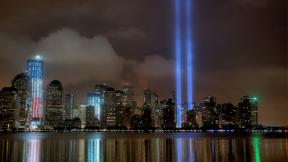
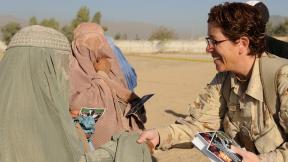

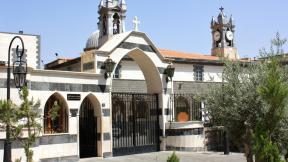
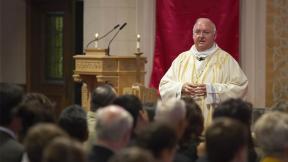


Comments
Roy you are good man because
Roy you are good man because you are not extreamist no religon is bad it is extreamism that brought destruction to the world christinity and islam both are good religions even the juralism is also good
You need to talk more about the Palestinian problem, but the article is very good. Islam is the true path and Prophet Muhammad (saw), no matter what religion you are, was the greatest man to walk the face of this planet.
Location
Excellent artical which completely make us understad the teaching of Islam toward other religion. I fully appreciate the effort made by the scholar in bringing harmony through its right up between Muslims and followers of other religion.
Location
Armenia-slaughter is a big big lia.AS you said Armanians betrayed to Ottoman and in that betrayal Armenians murdered a lot of Turks,not killed Armanianbs by Turks.And there was a war against their betrayal and genocide.Ottoman might did nothing they were betraying and killing Turks?Wait doing nothing?Or course no.And in consequence of the war Armenians died,also Turks too.Please delete or correct that part of the article. Best regards!
Location
In my history class i have discussed many issue about cristian and muslim's. yet i have observed one thing is that in the book its stated little things about cristian and many many things about muslim. for that i belive that the cristian's want people to know that we(muslims) are unique group of people that existed in the world. about not mentioning the chirstianity i have a question in my mind that why they didnt say things about themselves when they considered the most powerfull nation. why??? i belive that they have betrayed the people and took controll of them. here is another thing for ignorent people who doesnt want to learn or find the truth they suppose to and just follow the things that they learn in the inviornment and thought by their parent (wich is totally wrong). the reason i say this is because one time a little kid saw a man with a beared and he asked his mom who was he and she replyed that he was a terrorist. but i was very upset that without knowing anything about that person she just made a comennet that wasnt absolutely nessecery because i knew that person. i hope that people know the truth and could live together that stop giving people blame for any unnessecery things. God bless America And all of us.
Location
There is but one GOD. He gave us TEN commandments to follow. Period!Man has taken it upon him/herself to embellish through "organized religion" all that is taught today. None of what is taught comes from GOD except HIS commandments. To believe anything other than HIS commandments is a false belief. Period!Yet it is "organized religion" that has wrought all of the ills that have been injustices to humanity since the dawn of time. Man perceives himself to be more "godlike" by incorporating his own thoughts into his teachings of God's word. It will never stop because it is a human trait and failure. If you'd like to really have a perfect world, follow HIS commandments and like a completed puzzle....all will fall into alignment. So be it!
Location
This is a really great site, I came to get an Islam persceptive on things. I think that people throw the word "Christian" around to much, because going to church doesn't make you a christian, doing charity work doesn't make you a christian either. It's all about your relationship with God. My name does happen to be a christian name...lol (means follower of Christ or blessed) but I used to be agnostic. Also, you can't tell if someone is a christian by their lifestyle, some people just have morals without religion. I'm tired of the stereotyping, and people assume they know what kind of person I am because I'm a christian (repented and accepted Christ). They think I only believe my religion is "THE" religion to recieve salvation....not true! I would just love to live in peace with everyone of all cultures, although I know that's unrealistic right now. I try to see things through other's point of view.
Location
Religion(faith) is a relationship between an individual and God. The moment we judge individual's actions wholistically rather than individually, we miss the point. It is wrong to assume that whoever has a christian name is a christian or vice versa as it is wrong for individuals or groups to intepret Quran or Bible for their own interest. That is where the conflicts starts. We should learn to tolerate each other regardsless of the faiths we confess to. Either we mend or mess up the universe. Confessing Christians and Muslims should denouce violence and disalleniate the religion from the advocates and perpetuators of violence.
Location
An excellent precis of volumes of histrical account. Undoubtedly a dexterious endevor well accomplished without sacrificing facts for religioous fervor. The writer deserves our best compliments. God bless you all.
Location
All cultures must come together, God did not want people to kill and have animosity towards each other , but to love and have peace. Yes i am sad because of 9-11, not because it was an act of hate but because the people who did it supposively love God or praise Allah.
Location
Pages
Add new comment